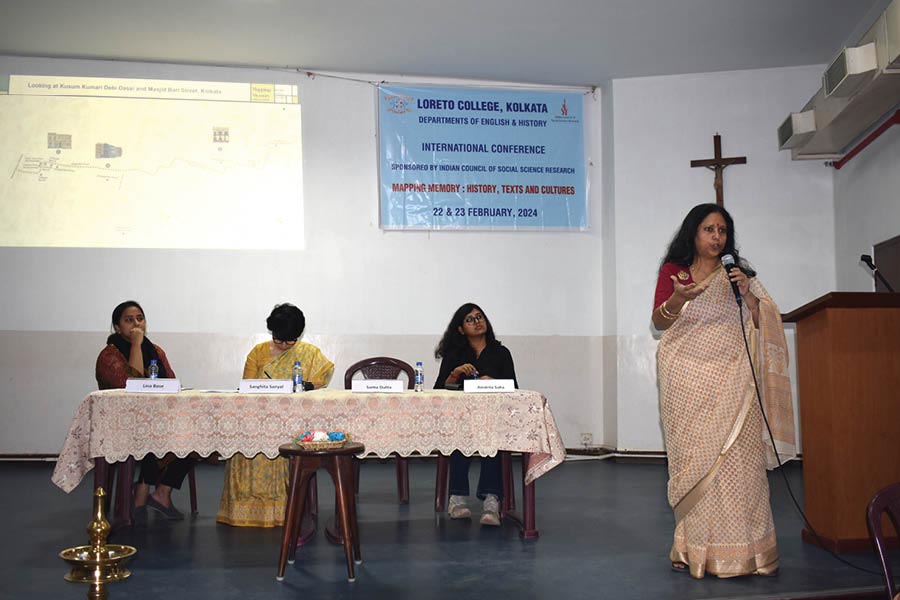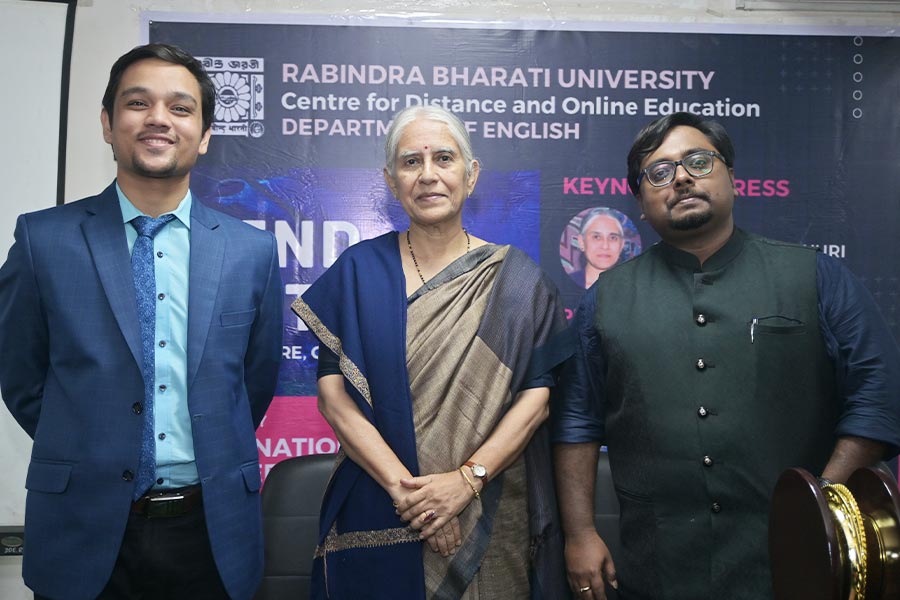The departments of English and history, Loreto College, Kolkata, organised an Indian Council of Social Science Research Eastern Regional Centre (ICSSR-ERC) sponsored international conference on ‘Mapping Memory: History, Texts and Cultures’ on February 22 and 23. The conference featured a wide range of multidisciplinary presentations on the concept of memory and its dynamic relationship with history, literature, art, politics and society. Over 300 students, faculty members, research scholars and practitioners across institutions in India and countries such as France, Belgium, Northern Ireland, Serbia, US and Canada participated in the conference and enlivened the critical discussions that unfolded over two days.
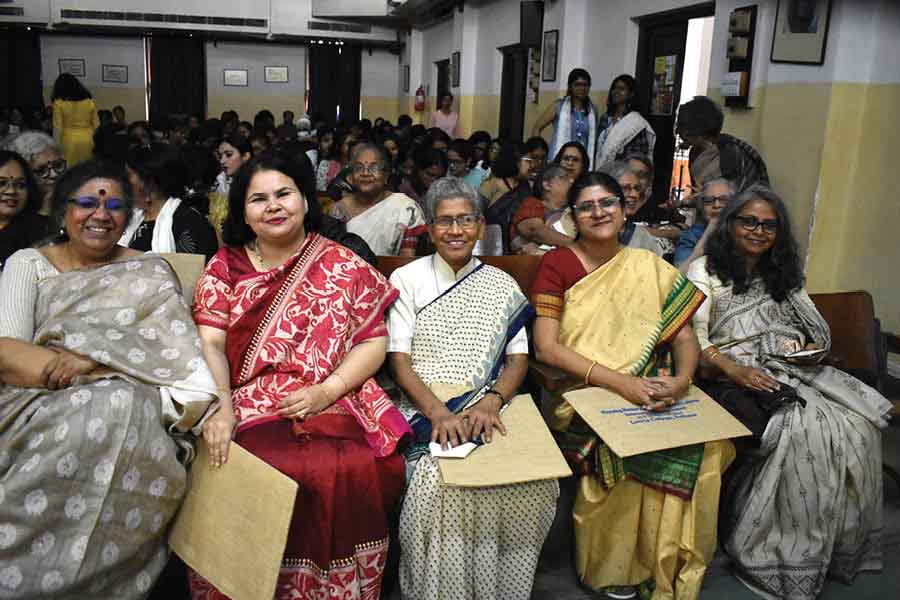
(From left) Ira Bhaskar, (retired) professor of cinema studies, Jawaharlal Nehru University; Debika Guha, officiating principal, Loreto College; Sister Antoinette, The Institute of the Blessed Virgin Mary; Suranjana Mitra, IQAC coordinator, Loreto College; and Sukanya Dasgupta, convenor and associate professor of English, Loreto College
The keynote address was delivered by Avishek Parui, associate professor in the department of humanities and social sciences at IIT Madras and founding chairperson of the Indian Network of Memory Studies. Parui’s lecture set the tone for the conference by foregrounding the idea of memory as a map with porous borders, involving a complex interplay of remembering and forgetting. He commented on conceptualisations of memory in the fields of science and history before proceeding to explore the relevance of literature and narrative for understanding how memory integrates information, imagination and emotion. He also drew attention to the expanding role of memory in a post-digital age, with artificial intelligence (AI) tools increasingly being used not only to remember and recreate the past, but also to project and anticipate possible futures.
History cannot be written in a vacuum of absolute objectivity
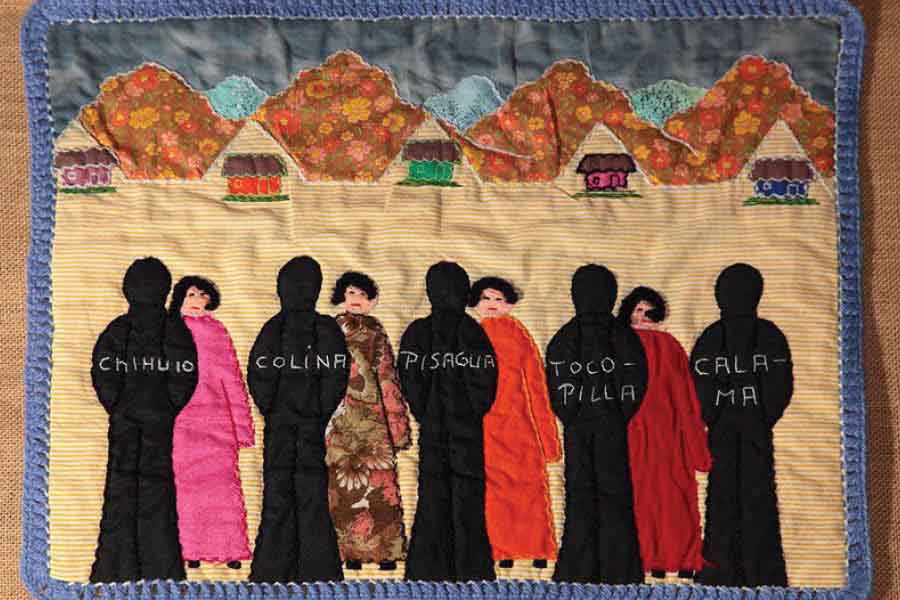
An arpillera from the Conflict Textiles collection displayed by Roberta Bacic
Parui’s address was followed by the first plenary session of the day, in which Shukla Sanyal, (retired) Nurul Hasan professor of history, University of Calcutta, studied the relationship between history and memory through an analysis of the memoirs written by revolutionary nationalists in Bengal such as Upendranath Bandyopadhyay, Bhupendranath Datta, Bina Das and Kamala Das Gupta. In her presentation, Sanyal emphasised that history cannot be written in a vacuum of absolute objectivity and must not be seen in opposition to the subjectivity of the memoir. Rather, history, memoirs, and collective memory are “contiguous categories” that can be creatively deployed by the historian to access and retrieve the past.
The second plenary session of the day was a virtual demonstration by Roberta Bacic, founder and curator of Conflict Textiles, an archive comprising arpilleras (burlaps), quilts and wall hangings that document memories of conflict and human rights abuse. Bacic displayed moving testimony pieces from a collection on victims of forced disappearance to illustrate how textiles as art forms can serve as living records of experience and resilience, telling stories of individuals and communities who have been subjected to political injustice, repression and violence. Bacic concluded her talk by showcasing three pieces from India on the Conflict Textiles website and encouraging the audience to explore the documentation of similar narratives in Indian textiles.
False memoirs occupy a liminal space between fact and fiction
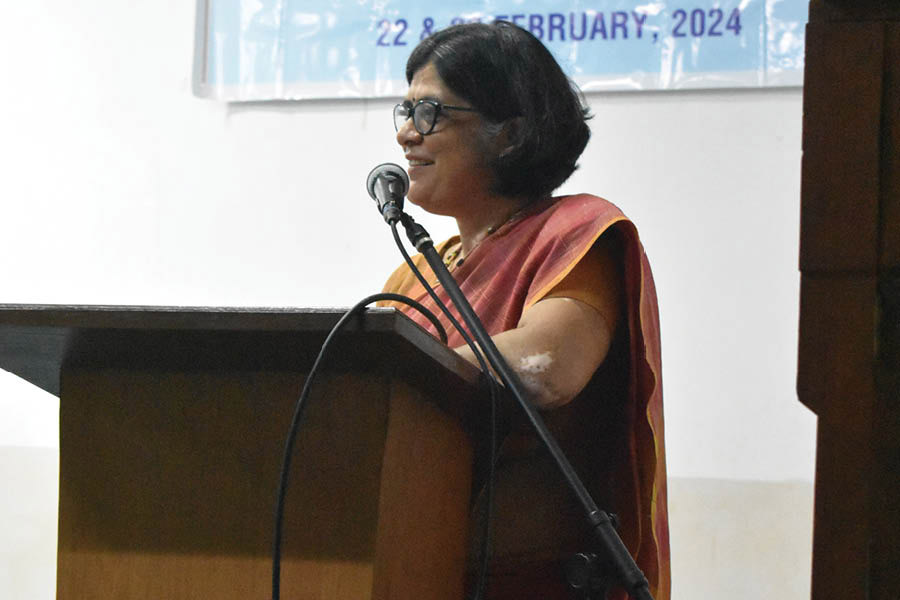
Plenary session by Prachi Deshpande
The first plenary session of the second day was delivered by Prachi Deshpande, associate professor of history, Centre for Studies in Social Sciences, Kolkata. Deshpande’s presentation focused on the Marathi writer and activist Durga Bhagwat, whose controversial memoir, As I Remembered It, was widely decried for its ostensible lack of truth. Noting how such deliberately false memoirs occupy a liminal space between fact and fiction, Deshpande argued that texts of this nature should be regarded less as empirical sources and more as stories with a moral structure, akin to folktales, articulating deep truths about the culture at large. This was followed by a presentation by Ira Bhaskar, (retired) professor of cinema studies, School of Art and Aesthetics, Jawaharlal Nehru University on how memories of collective trauma may be both liberatory and malignant. Through a series of clips from Indian movies on the Partition and its aftermath, Bhaskar traced the role of cinema in the creation of historical memory.
In the final plenary session, Stef Craps, professor of English and director of the Cultural Memory Studies Initiative at the University of Ghent, Belgium drew on Peter Kahn’s concept of “environmental generational amnesia” to highlight how each new generation accepts the diminished planet it receives as a norm, which adversely affects their ability to urgently tackle environmental challenges. Craps underlined the role that the creative arts can play in countering planetary amnesia by keeping memories of past environmental conditions alive in the social fabric and encouraging transformative action. He cited Maya Lin’s multimedia project What Is Missing?, a global memorial to the planet that showcases numerous disappearing species and environments through a “Map of Memory”.
‘One of the aims of the conference was to explore the ways in which cultural memory crystallises shared experiences’
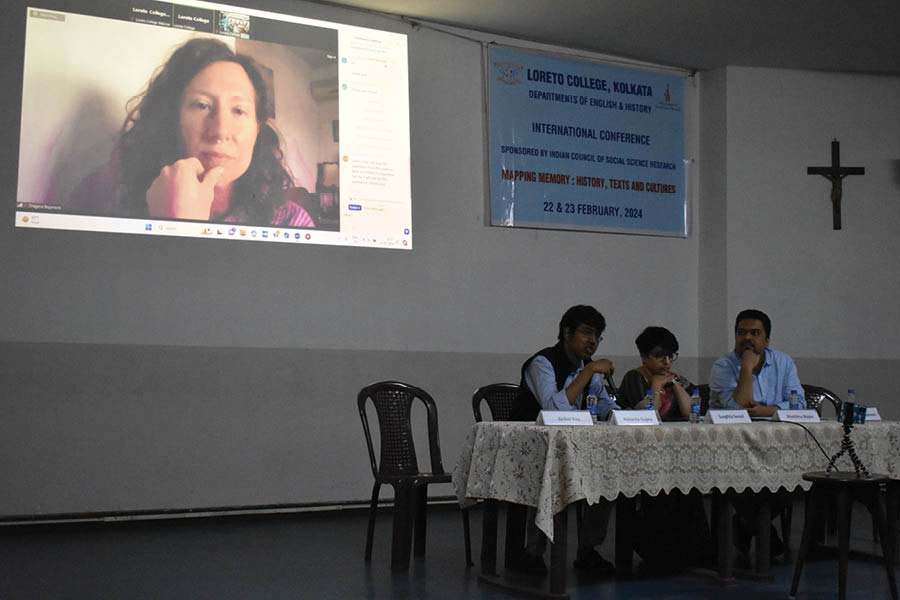
One of the participants from the University of Singidunum, Belgrade joining a panel
Each of the plenary sessions generated spirited responses from the attendees. Sudeshna Sarkar, a student of the department of history at Loreto College, said: “It was a privilege to hear these intellectual stalwarts, who shed light on the importance of preserving and mapping memories for a deeper understanding of our past.” The plenary sessions were also interspersed with 12 technical sessions featuring 40 papers on a wide range of subjects by research scholars and faculty from various institutions in India and abroad. The papers were greatly appreciated by the audience, with Bhaskar especially commending the “well-organised” panels. Dragana Stojanovic, who presented her paper on new museology from Belgrade, noted how the questions she got after her session ‘inspired’ her thought, while Ananya Sarkar, a participating doctoral scholar from Jawaharlal Nehru University, remarked: “I look forward to attending more conferences like this in the future.”
Sukanya Dasgupta, associate professor of English and convenor of the conference, said: “One of the primary aims of having an interdisciplinary conference on memory studies was to explore the ways in which cultural memory crystallises shared experiences.” Papers on themes as diverse as Partition, literary historiography, oral narratives, collective memories, city spaces, music, art and photography brought scholars from different disciplines in conversation with one another and illustrated how knowledge sharing can open up new avenues of enquiry in the burgeoning field of memory studies. Debika Guha, the officiating principal of Loreto College, congratulated the departments of English and history on an enriching international conference: “The feedback we received from resource persons and participants from all over the globe has been excellent and is a testament to the organisers’ hard work and commitment.”
